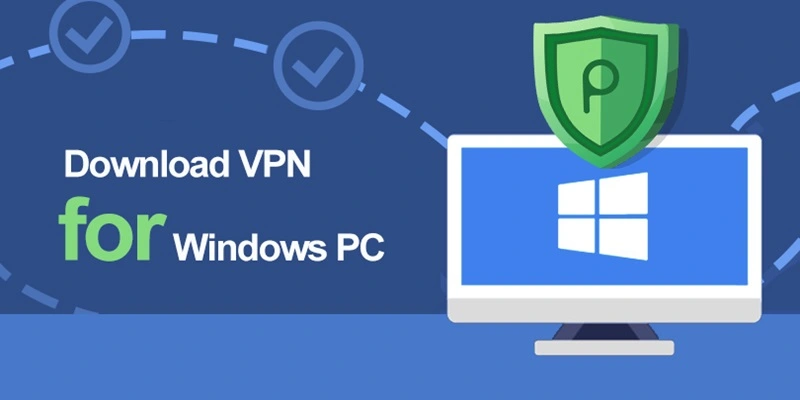In today’s digital landscape, the concept of online privacy has taken on a new level of importance. Every time you use the internet, your personal data is at risk of being exposed, monitored, or even stolen. That’s where a VPN for PC comes in – a powerful tool designed to secure your online activities. In this guide, we’ll break down everything you need to know about VPNs and why they’re crucial for your PC.
What is a VPN and How Does It Work?
A VPN (Virtual Private Network) is like an invisible shield that protects your online identity. But how does it work?
When you connect to a VPN, your data is encrypted and sent through secure servers across the globe. This process hides your real IP address, effectively making you anonymous online. So, even if hackers or your internet service provider try to track you, they won’t be able to see your actual location or what you’re doing.
Why Should You Use a VPN for PC?
Protect Your Privacy
Your internet service provider (ISP) monitors every website you visit and file you download. With a VPN for PC, your browsing data is encrypted, meaning even your ISP can’t snoop on your activities.
Stay Safe on Public Wi-Fi
Public Wi-Fi is incredibly risky because it’s often unsecured. Hackers can easily intercept your data. A VPN for PC encrypts your data, keeping your sensitive information (like bank details) safe even when you’re connected to public networks.
Bypass Geo-Restrictions
A VPN for PC allows you to access region-restricted content, like Netflix shows available only in certain countries. It does this by masking your IP address and making it look like you’re browsing from a different location.
Secure Sensitive Transactions
Whether you’re banking online, shopping, or working remotely, using a VPN for PC protects sensitive data from potential cyber threats.
Types of VPNs for PC
Now that you know why you need a VPN for PC, let’s explore the different types available:
Free vs. Paid VPNs
There are both free and paid options when it comes to VPNs. However, free VPNs typically have limitations like slower speeds, fewer server locations, and weaker security features. Paid VPNs, on the other hand, offer more comprehensive protection, faster connections, and better customer support.
Dedicated VPN Software for PC
Many VPN providers offer dedicated software for PCs, making it easy to install and use. These applications usually have a simple user interface, allowing users to connect to a server with just one click.
Browser-Based VPNs
Some VPNs are available as browser extensions. While they offer convenience, browser-based VPNs typically protect only your browser activity and not the entire PC. If you want full protection, dedicated VPN software is the way to go.
How to Choose the Best VPN for PC
When it comes to selecting the best VPN for PC, there are several key factors to consider:
Security Features
Look for a VPN that offers military-grade encryption (such as AES-256), a no-logs policy, and a kill switch. These features ensure your data remains safe and that your online activity isn’t tracked.
Speed and Performance
A good VPN for PC shouldn’t drastically slow down your internet connection. Look for VPNs that have fast servers and offer unlimited bandwidth, so your browsing, streaming, and downloading aren’t affected.
User-Friendly Interface
The best VPNs are those that are easy to install and use. Look for VPNs with a simple interface, especially if you’re new to using this type of software.
Compatibility
Ensure the VPN you choose is compatible with your operating system. Most VPNs work on Windows 10 and Windows 11, but it’s important to check if they support other versions of Windows as well.
Customer Support
Since you may face technical issues, it’s important to choose a VPN that offers reliable customer support. Look for 24/7 assistance, live chat, or email support for quick help.
How to Set Up a VPN on Your PC (Step-by-Step Guide)
Now that you’ve selected the right VPN, here’s a step-by-step guide to help you set it up on your PC.
Step 1: Choose and Download a VPN
Choose a reliable VPN provider like NordVPN, ExpressVPN, or CyberGhost, and download their dedicated software for Windows from the official website.
Step 2: Install the VPN Software
Follow the on-screen instructions to install the VPN software. Most VPN applications for PC are easy to install, requiring just a few clicks to complete the process.
Step 3: Launch the VPN and Log In
Once installed, open the VPN application and log in using the credentials you created during signup.
Step 4: Connect to a Server
Select a server based on your needs (e.g., a server in the US to access American content) and click “Connect.” Your connection will be secured in seconds.
Step 5: Test Your VPN Connection
To ensure your VPN is working, check your IP address online. If the VPN is active, your IP address will show the location of the server, not your actual location.
Top 5 VPNs for PC in 2024
Here are the top VPNs for PC to consider:
NordVPN
Renowned for its robust security features, including double encryption and a no-logs policy. NordVPN offers a vast server network and fast speeds, making it ideal for both privacy and streaming.
ExpressVPN
ExpressVPN is known for its exceptional speed, making it a great choice for streaming and gaming. Its strong security features ensure your data stays safe, no matter where you browse.
CyberGhost
CyberGhost is a user-friendly VPN perfect for beginners. It offers optimized servers for streaming services like Netflix, making it easy to bypass geo-restrictions.
Surfshark
If you need to protect multiple devices, Surfshark is the best option. It allows unlimited simultaneous connections, and its security features ensure a safe browsing experience.
ProtonVPN
ProtonVPN offers a reliable free plan with no data limits, making it a great option for those who need basic privacy features without spending a dime.
Common VPN Issues and How to Fix Them
Even the best VPNs can experience issues. Here’s how to troubleshoot common problems:
Slow Connection Speeds
If your VPN connection is slow, try switching to a server that’s closer to your location or change the VPN protocol for better performance.
VPN Keeps Disconnecting
Frequent disconnections can be frustrating. Check your internet connection and try switching servers. Enabling the VPN’s kill switch will help protect your data in case the connection drops.
Streaming Services Blocked
If a streaming service like Netflix or Hulu is blocking your VPN, try connecting to a different server. Many VPNs have servers specifically optimized for streaming.
In today’s digital age, ensuring your online safety and privacy is more important than ever, and using a VPN for PC is one of the most effective ways to protect yourself. Whether you’re safeguarding sensitive information, bypassing geo-restrictions, or simply maintaining your anonymity online, a VPN is an essential tool. From public Wi-Fi risks to privacy breaches, using a VPN can make a significant difference in keeping your data secure.
If you’re looking for more help setting up your VPN or need assistance with other tech-related issues, PC Servicing BD is here to support you. As one of the best computer service providers in Dhaka, PC Servicing BD can help you install VPN software, optimize your PC’s performance, and ensure your system is fully protected. Don’t leave your online security to chance—equip your PC with the right tools and services for a safe, smooth online experience.

